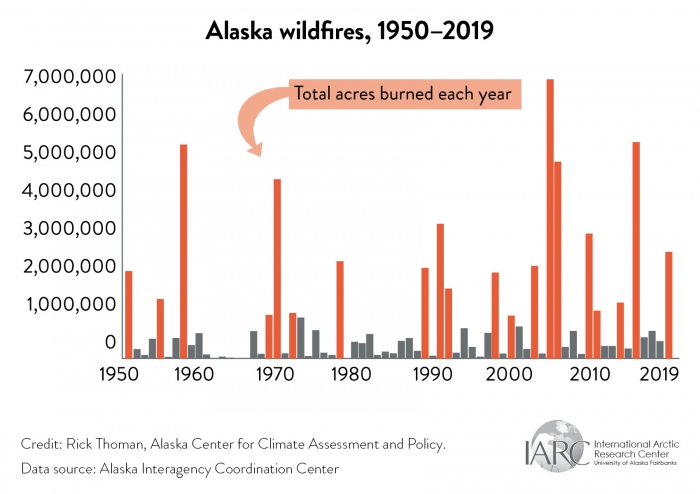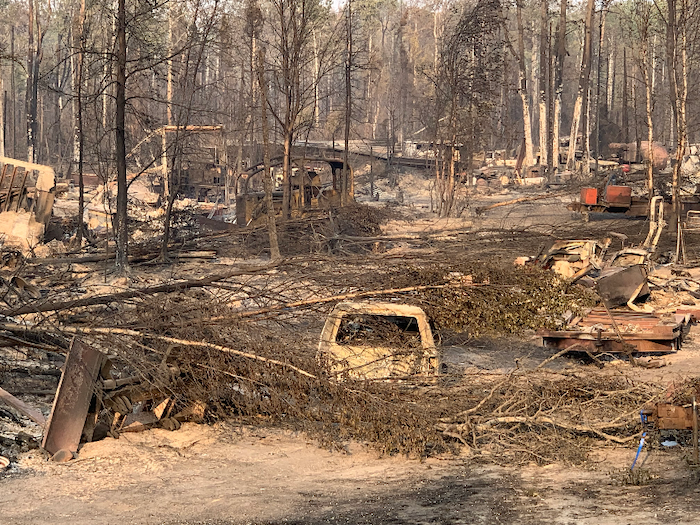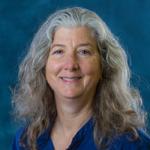By: Alison York, Alaska Fire Science Consortium Coordinator
The Arctic and boreal regions saw an active wildland fire season in 2019, with fires in Siberia, Canada, and Greenland that received considerable media coverage (For example, see the Smithsonian's SmartNews article The Arctic is Experiencing It's Worst Wildfire Season on Record). In Alaska, which had a record warm summer, wildland fire consumed more than 2.5 million acres, more than half the total acreage burned in the U.S. (See Figure 1, and the Alaska Interagency Coordination Center (AICC).)

(For further information see: Alaska's Changing Environment.)
Extremely dry conditions in Southcentral and Southwest Alaska drove notable late-season fire activity in mid-August, when season-ending rains normally slow fire growth. The McKinley fire started on August 17 during a period of strong winds that spread fire rapidly, destroying more than 50 homes, 80 outbuildings, and 3 businesses (Fig 3). At the same time, the Swan Lake fire on the Kenai Peninsula, which started in June, became very active again, forcing repeated highway closures and threatening properties, while a series of new fires started in Southwest Alaska, including one that burned into the village of Levelock.

As climate change affects wildland fire regimes (Partain et al, 2016), fire and land managers need current, specific, actionable science on a range of issues to support their decision-making. The Alaska Fire Science Consortium (AFSC) is one of 15 regional fire science exchanges supported by the federal Joint Fire Science Program to accelerate the awareness, understanding, and adoption of wildland fire science information by end users. Housed at the International Arctic Research Center (IARC)at the University of Alaska Fairbanks, AFSC has worked since 2009 as a boundary spanner with both academic researchers and Alaska's interagency fire management community to improve the scientific basis of managers' decision-making. More background on AFSC is available in an article published in Witness the Arctic, Fall 2016.
AFSC as a Model for Coproduction of Science
A recent case study of AFSC documents how this boundary spanning organization has transitioned from a focus on science delivery in its early years to an increasing focus on coproduction of science--involving managers in research activities designed to produce actionable science for their use (Colavito et al, 2019). The study defines coproduction as:
A collaborative research approach that explicitly involves the end users of the research in all stages of knowledge development and dissemination to varying degrees, but which maintains an emphasis on two-way, iterative, and sustained interactions and the production of actionable science.
The study found four key factors in AFSC's transition to coproduction:
- A receptive and engaged audience. AFSC operates in the context of an interagency fire management community that is keenly aware of the importance of actionable science for decision-making—often because they cannot rely on information developed for the contiguous U.S.—and eager to participate in research opportunities;
- Built in evaluation and learning. External evaluation and internal activities assessments have provided regular, iterative feedback from AFSC's end users since the beginning of the program;
- Subject matter expertise and complementarity. AFSC's fire ecologist and fire analyst are retired from fire management careers, which provides a deep understanding of management issues and builds trust with end users;
- Embeddedness in the target audience communities. Alaska's interagency wildland fire management community views AFSC as a neutral science broker and a key element in its governance structure (Rutherford and Schultz, 2019).
Upcoming activities
AFSC plans several upcoming events, including:
- Spring 2020 fire science workshop, 25 March, in Fairbanks. AFSC organizes two half-day fire science workshops each year in association with the interagency fire management community's seasonal meetings. Past presentations are archived and available to review on the AFSC Events & Webinars webpage.
- AFSC-ABoVE Research to Operations (R2O) workshop, 14—15 May in Fairbanks. AFSC is working with the NASA Arctic-Boreal Vulnerability Experiment (ABoVE) to organize a hands-on workshop on using remotely sensed data and products in operational and decision-making settings. The workshop will be coordinated with the 6th ABoVE Science Team Meeting in Fairbanks, 11—14May 2020. This will be a great opportunity for researchers and managers to work directly together to follow up on the progress made by the 2017 AFSC remote sensing workshop and its report and explore the use of promising research products in a management context. The ABoVE domain includes most of Alaska and western Canada, and the workshop will include Canadian colleagues.
For more information, visit the AFSC website, or contact AFSC coordinator Alison York, via email (ayork [at] alaska.edu) or by phone: 907-474-6964.
About the Author
 Alison York, Alaska Fire Science Consortium Coordinator, is also affiliated with the University of Alaska Fairbanks International Arctic Research Center (IARC) and the Alaska Center for Climate Assessment and Policy (ACCAP). She has expertise in Alaska fire ecology, tundra fire, fire management, and science communication.
Alison York, Alaska Fire Science Consortium Coordinator, is also affiliated with the University of Alaska Fairbanks International Arctic Research Center (IARC) and the Alaska Center for Climate Assessment and Policy (ACCAP). She has expertise in Alaska fire ecology, tundra fire, fire management, and science communication.
